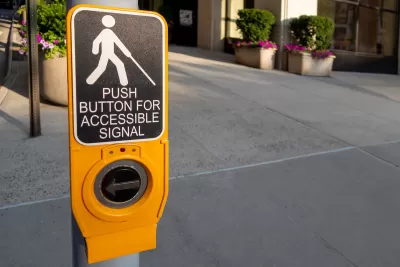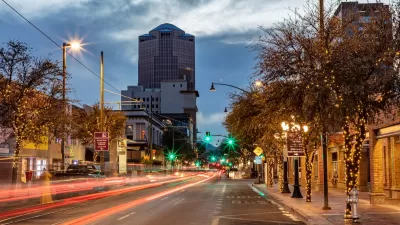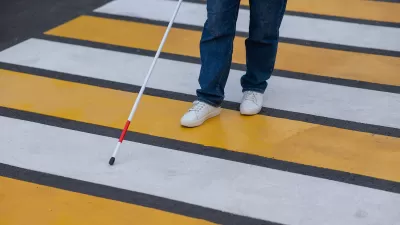Some critics of car-free zones call them exclusionary to people with disabilities, but other experts argue that, when properly planned, pedestrian enhancements improve safety and accessibility for everyone.

In a piece for Mother Jones, Julia Métraux explains how accessibility is being used as a “political football” to push back against car-free zones and other pedestrian infrastructure that some say harms mobility for disabled people. “Opponents of such initiatives have called them ‘exclusionary,’ ‘not progressive or inclusive,’ and bound to ‘hurt people with disabilities,’ pointing out that many disabled people simply need cars to get around.”
Yet disabled people are more likely not to drive, and car-heavy cities are more dangerous to disabled people, says expert Anna Zivarts. “A 2015 study by Georgetown University researchers found that the rate of vehicle-pedestrian deaths among wheelchair users was 36% higher than that of the overall population.”
Even when accessibility is an issue, it’s often easily solved. “In 2022, when San Francisco’s Golden Gate Park permanently closed a major boulevard to cars, opponents, including city Supervisor Connie Chan, said it was disabled and aging folks who would pay the price. But free shuttles, accessible to anyone, now bridge the gap.”
San Francisco also maintains a dialogue with disabled residents to ensure its programs serve them. When the city was evaluating its scooter sharing program, feedback from a group of students with disabilities helped the city opt for scooters with backrests and larger wheels for stability to ensure more people can ride them.
FULL STORY: Do Car-Free Zones Hurt Disabled People? Experts Explain.

Planetizen Federal Action Tracker
A weekly monitor of how Trump’s orders and actions are impacting planners and planning in America.

Chicago’s Ghost Rails
Just beneath the surface of the modern city lie the remnants of its expansive early 20th-century streetcar system.

San Antonio and Austin are Fusing Into one Massive Megaregion
The region spanning the two central Texas cities is growing fast, posing challenges for local infrastructure and water supplies.

Since Zion's Shuttles Went Electric “The Smog is Gone”
Visitors to Zion National Park can enjoy the canyon via the nation’s first fully electric park shuttle system.

Trump Distributing DOT Safety Funds at 1/10 Rate of Biden
Funds for Safe Streets and other transportation safety and equity programs are being held up by administrative reviews and conflicts with the Trump administration’s priorities.

German Cities Subsidize Taxis for Women Amid Wave of Violence
Free or low-cost taxi rides can help women navigate cities more safely, but critics say the programs don't address the root causes of violence against women.
Urban Design for Planners 1: Software Tools
This six-course series explores essential urban design concepts using open source software and equips planners with the tools they need to participate fully in the urban design process.
Planning for Universal Design
Learn the tools for implementing Universal Design in planning regulations.
planning NEXT
Appalachian Highlands Housing Partners
Mpact (founded as Rail~Volution)
City of Camden Redevelopment Agency
City of Astoria
City of Portland
City of Laramie




























